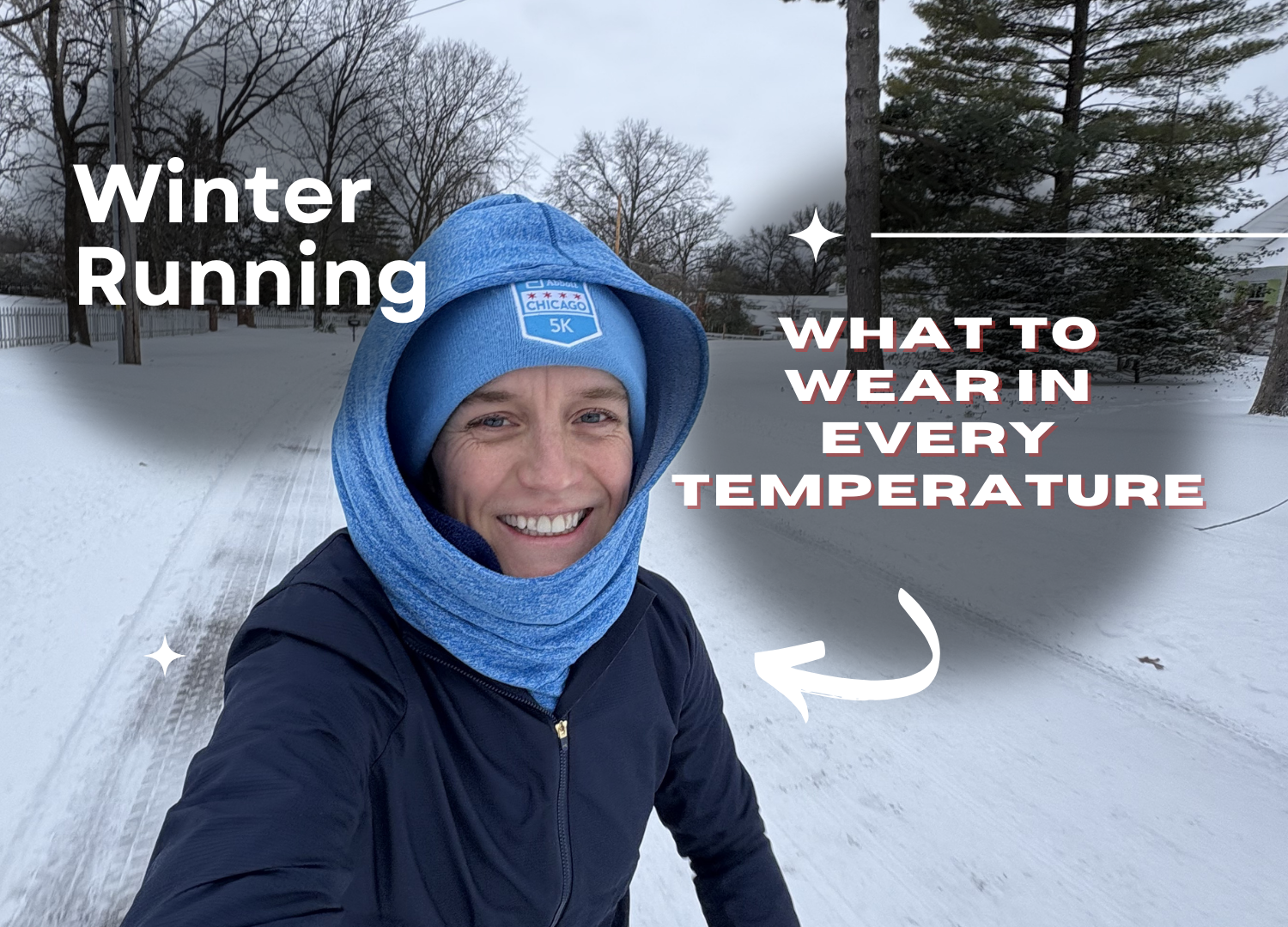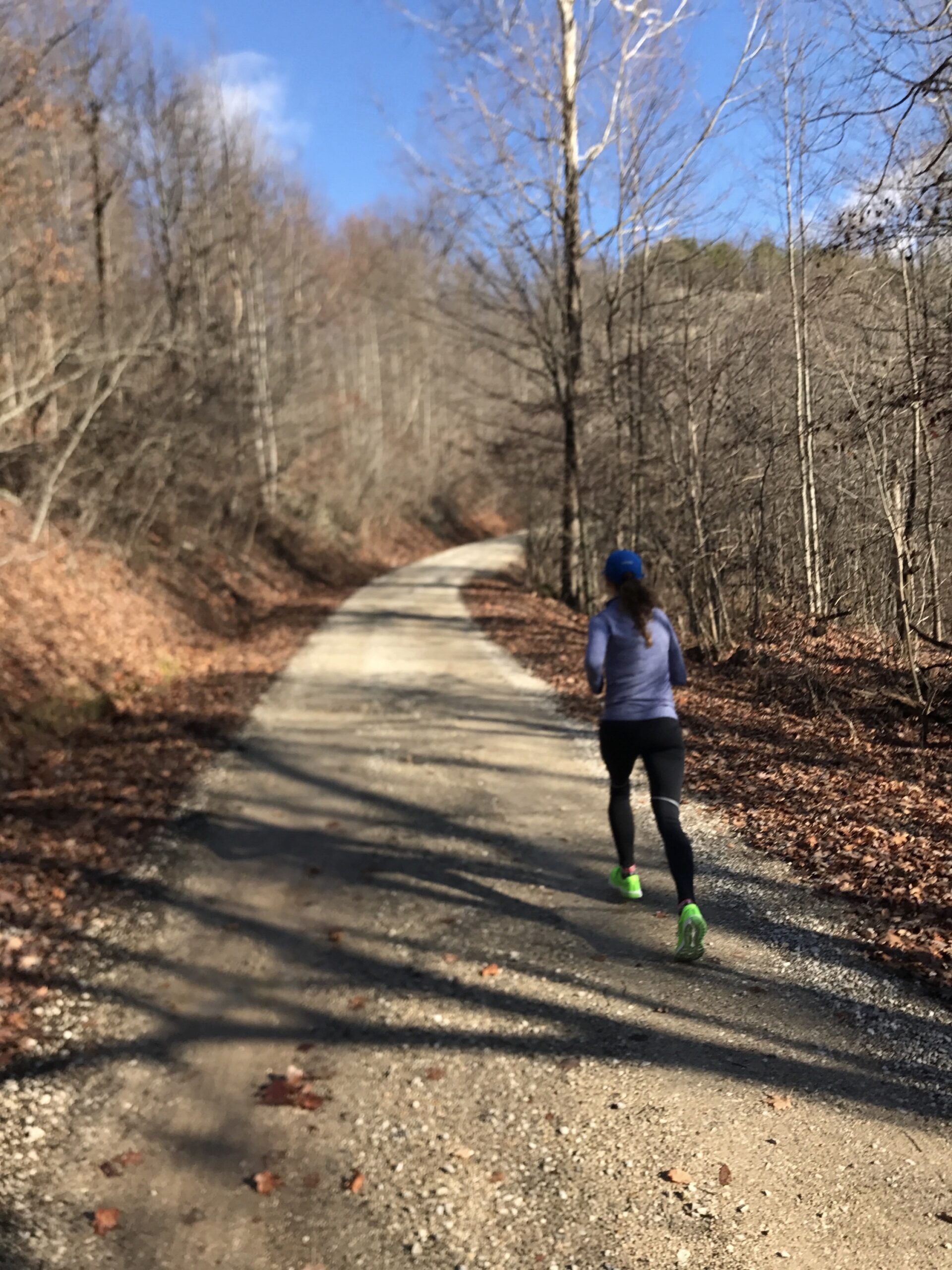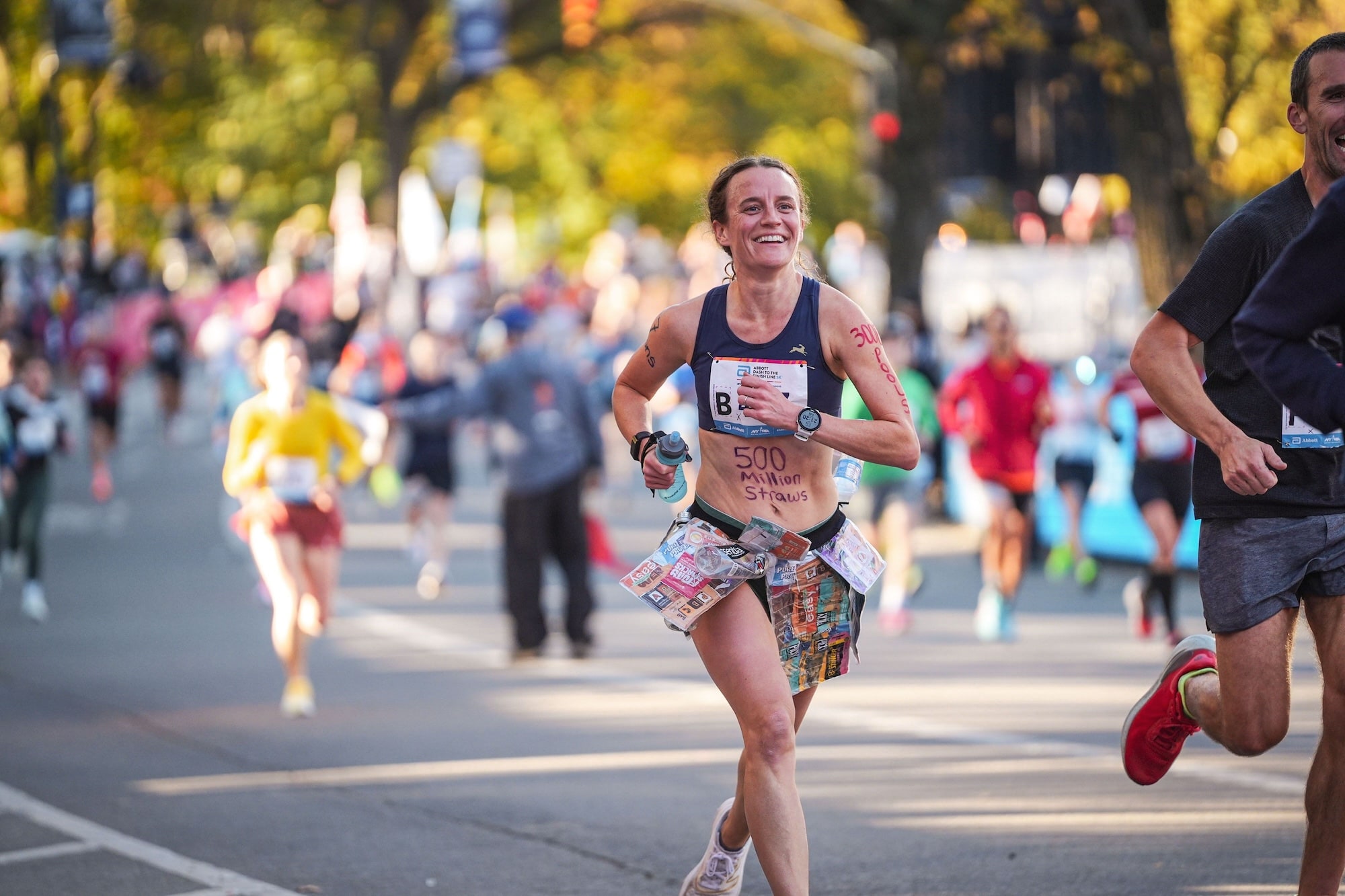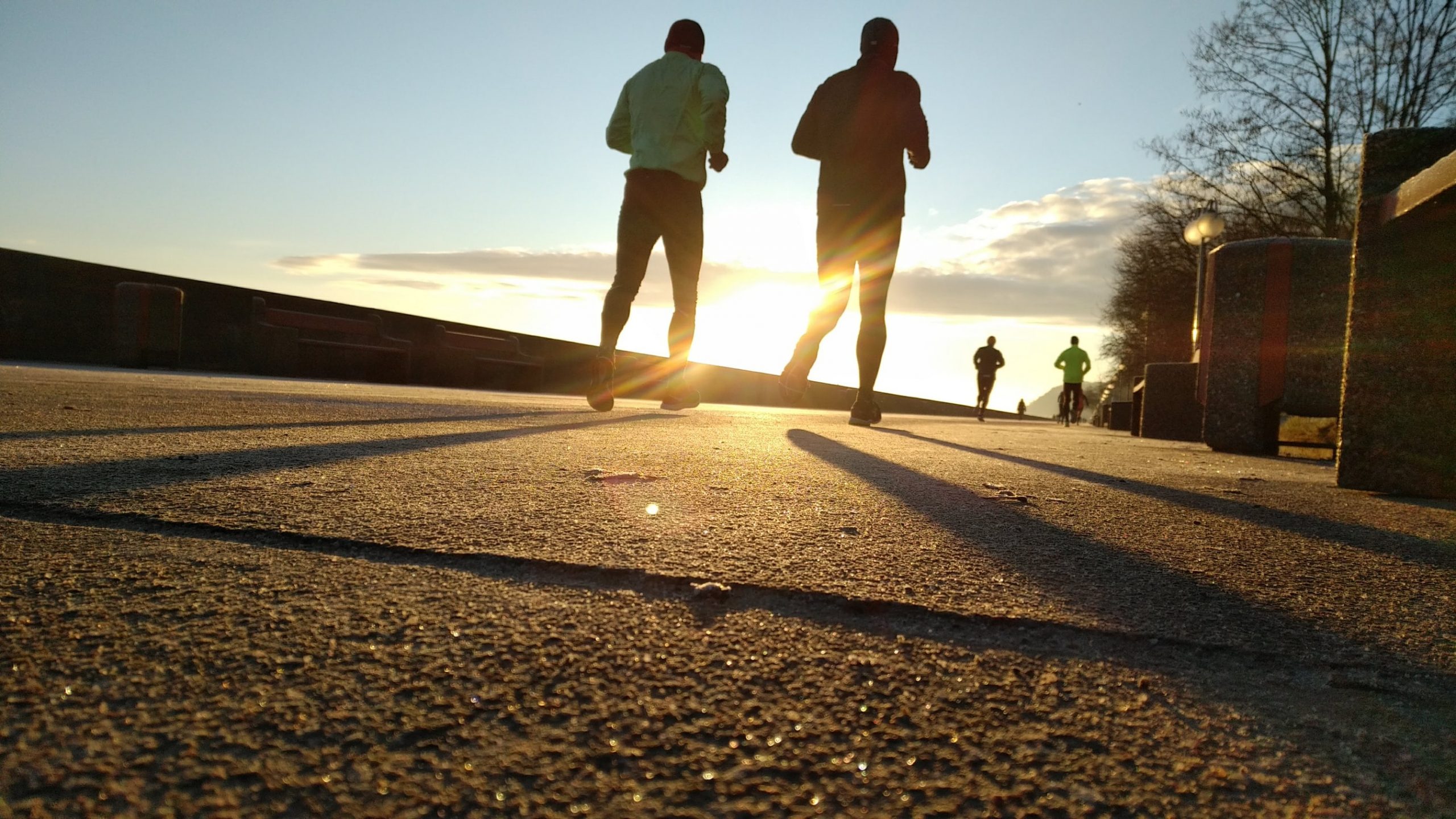REAL runners run for miles, kilometers, distance. Running by time is for the inexperienced, right?
Actually, no. Running by time instead of distance might be just what you need, and since I gave it a try in early 2018, I haven’t looked back. I genuinely believe it is BETTER!
I ran using distance for many years; throughout college and in my professional running years.
I would obsessively analyze my GPS watch data. I would do the back and forth running in front of my house to make sure my run distance had two zeros at the end, and my mileage at the end of a week was always a round number.
Not that there was anything wrong with that way of training. I ran for my country in a world championship and had PRs of 2:36 (marathon), 1:13 (half marathon), and 16 minutes (5k). Building my mileage allowed me to reach the level of training that would allow for those, and tracking the number of miles was a good way to stay on top of it.
Interestingly though, when I look back on the years before college (that reflection I talked about in the first paragraph), I mostly ran by minutes, and you know what, training was so much less intense, and in many ways, more enjoyable. I did what I needed to do, and then got on with my day, rather than feeling annoyed at the imperfection of mileage when I was not able to get it just how I wanted it.
Mind you, back then, everyone trained by time. There were no GPS watches, and life was much simpler.
Regardless of level, speed, ability, or experience, time based running programs to something to consider. You can still ramp up your running mileage. Running for time training will get you race ready, help you lose weight, get fit, or any other reason you might run, with one HUGE bonus:
It removes a LOT of pressure and expectation. Pressure and expectation in our running that can suck a lot of the fun out of it.
I am not saying I was wrong to run for distance rather than minutes in the past, it helped keep the intensity of the goals I wanted to do, BUT I believe distance training is for certain periods of our lives, and not necessarily just for when we WANT a goal bad. At some point, we all can use the reduced stress it puts on our running. Sometimes, a break from distance based running is just what we need.
And yes, you can do marathon training by time, not distance too!
Why beginners should run for time not distance
If you are a beginner, running for time not distance should be the only way to increase your mileage.
You have zero running to compare to, and the minutes seem like a LOT, which is good! Thirty whole minutes of running, well done you, my friend! That sounds a lot more impressive to our psyche than 1.5 miles. It is a numbers game, and minutes allows you to get to higher numbers, which helps you to feel more confident about what you are doing. It also limits how much you can compare yourself to other runners who have been doing it for a while.
While it might not eliminate it, it can help you stay in your own lane, especially if you are doing a walk run plan, you will be able to build up to a higher number of minutes, and be out there the same amount of time as a more experienced runner…as long as you stay away from comparing yourself to their long run days!
For my beginner friends, this Beginner Running Podcast series will pretty much give you everything you could ever need to know about coming into the running world, and one of the Guests, George Anderson explains how new runners can ramp up mileage using minutes.
Why experienced runners should consider running for time not distance
What if you are not a new runner and you have been running for years? What if you have a BIG goal and you have been working your butt off to get there? Or what if you have had to take some time off to have a baby, and you are on your postpartum comeback to running, you NEED to get back out there?
Why would you bother running by minutes when miles has worked in the past?
Especially when I just said that the miles motivated me.
Well, I always thought I needed miles to motivate me, and you probably do too, but actually, I have to admit, that even on my postpartum return to running, even with the words of “she retired” in my mind, words I want to bury, and fight against, I am still choosing to run by distance over time.
I have made it pretty clear that I am a fan of #nowatchme and Steve and I even created 5k/10k, half marathon and full marathon training plans that are 100% effort based, rather than pace based. Now we are taking it one step further with my training and the lack of structure.
Friends, I wanted to tell you today how refreshing and rewarding it has been, and maybe it will be good for you too, both mentally, and physically.
I know our races are specific distances (except for if you are in the UK and you are racing cross country), but really, those should be the only measured distances, the occasions we DO want to know our pace and how fast we were able to sustain. Those are the days that matter to show how far we have come.
The rest of your running though, really, it is about getting in the work as best you can. Doing the best you can with the situation you are presented with on that day, and allowing it to add up to create a fitness beyond what you have achieved before.
Your body does not know these details we focus on so heavily. It does not know what a pace is. It does not know what a mile is. It does not know anything except for where this falls on the level of difficulty it can handle and the amount of time you are on your feet. The harder you run, the less you can do. The easier you run, the more running you can do.
That simple.
If you are someone who has a really big goal. Maybe you think that running a certain number of miles or a certain pace will show you that you are ready to go, will give you the confidence on race day. It can, and even using time over distance, it is not that you can’t look at it afterwards. Go nuts on strava.
But while you are out there, in the moment, if you find yourself mentally struggling. If you find that you are questioning why you are even doing this at all, wondering why you are feeling so bad, and just generally feeling like your mind is in a negative space, it might be a good idea to look into running time over distance.
That way you can get your head out of the way, and just focus on getting through the minutes you have assigned. Successfully accomplish something, rather than feeling like you are a failure all the time, never able to reach the standard you want to get to.
Let’s say you would usually have a workout of 6 x 1 mile, and your goal marathon race pace would be 9 minutes per mile on average. If you run 6 x 9 minutes, you are still getting about the same amount in for the day, but maybe you end up running 6 x 1.2 miles because you are no longer obsessing over your watch. If it is particularly humid that day, you are running on tough terrain, or just have had a few really bad nights sleep, maybe you only make it 8 x 0.9 miles, but you still got the practice in for race day without overdoing it by forcing yourself to do extra just because some variables made it change.
You also didn’t allow your head to freak you out because you didn’t know how fast you were going. Less mental freakouts to deal with.
I actually really enjoy getting to the end of the week and finding out what my mileage total is, but rather than letting it ruin how I feel when I am a little less than I expect on a stressful week, I let it go, because I know I did my best for that week.
I am not saying I do not look at the mileage during the week. I will still look over my paces from my workouts (after!!) and I will look at what I averaged for my long run that week, but then it is on with the day.
I also can let it go when I get back to my starting point and see my watch says 7.9 miles. Rather than adding on the .1 for the sake of it, I am able to just come to a walk, satisfied I have done what I needed to.
Running by minutes is a way to feel success, rather than frustration and disappointment in yourself for not doing enough. Have you ever had a to-do list that you just keep adding to day after day, but never manage to get it complete? it leaves you feeling like a failure, like you are always behind.
That is what running for distance instead of time can do to you. Make you feel like you need more, more, more.
Running by minutes, you know exactly how long it will take, going faster doesn’t help you in any way, which means you are less likely to go faster than your body is ready and recovered to go. You just go whatever pace feels right for that specific run. If it is a hard run, you run as fast as you can for 30 minutes or whatever it will be. If it is an easy run, you run for an hour at whatever speed feels like you are recovering as you should be.
You get the same work in, with a more relaxed and confident mindset.
So why would running for time instead of distance work for you?
- If you are someone who runs too fast on their easy days. Running for time (especially if you have the restraint to not even wear a GPS, but even if you do and run #nowatchme, not looking at your pace) will mean that it doesn’t matter how fast you go, you don’t get finished any sooner, so what is the point of speeding up? You will run whatever pace actually feels easy
- If you are trying so hard to reach a goal, you have been trying for years, but just can’t seem to get there. You try harder and harder, but just seem to get further and further away. This doesn’t mean you are less committed, it just means you are trying a less stressful version of your training plan. Less pressure=more likely to reach goal
- If you are coming back from a long-term injury (did you listen to my coming back from injury podcast series), or you are on your postpartum journey after having a baby. Comparison can be very dangerous at this time, and running by time stops the ability to compare
- If you feel like you are losing the love of running. If it is becoming a chore and you are struggling to maintain motivation as you just don’t feel like you are getting the results. Could pressure be the cause? Changing it up might go a long way, and it can mean you can run in all kinds of different places without feeling like you have to run a certain pace
How to run by time instead of distance- what are my options?
If you are prepared to give it a go, there are varying levels. Maybe you will start with just easy runs and end up at everything, or maybe, if you need a change, you will do total time training from the start.
Running for time for everything
You can go all in, like I have.
That means running totally by effort (my effort scale would come in handy here), no paces involved in any of your runs (yes, you can still geek out AFTER, just during there is no looking).
Your easy runs, workouts, and long runs are all done by time.
Examples of some workouts that I have done:
- 3×10 minutes, 2×2 minutes with 3 minutes recovery
- 40 minutes of rolling hills (hard up, easy jog down)
- 15 minutes, 10 minutes, 2×3 minutes, 2×2 minutes, with 2 minutes recovery
- 10×1 minute hard with 1 minute easy
Use your average easy run pace, convert that to how many miles roughly you would like to do to figure out how many minutes to do for your easy days. For example, if you usually run 10 minute miles for your easy days, and you usually run about 7 miles. Sometimes you might run 10:30 miles on easy days after a workout, and other days when you feel good, you might run closer to 9:30 per mile. Go in the middle, and just use that conversion every day for your easy runs. Once you have figured out what each mile run converts to 6 miles=60 minutes, 7 miles=70 minutes, 8 miles=80 minutes ect, just do that every day. No need to recalibrate again.
When it comes to long runs, think about how long you are out there. Take your previous long runs in other training segments, and just run for those durations of time during this training segment. If you previously did four 20 mile runs that ended up being around 3 hours within your 16 week plan, do 3 hours four times this segment. Forget about the miles, and instead, think about reaching the minutes you will be spending out there (or the equivalent).
This is not even necessarily for those of you who have changing goals and are not really sure where your running is going right now. You could easily take this approach to all of your training. Long runs just go by hours and hard sections go by minutes, you really can do everything here.
Running for time on long runs and easy days
This is the Goldilocks of minutes running…if you are skeptical that is.
Do all your easy runs by minutes. Do your long runs by minutes. Do your workouts by miles and kilometers. Those are the days that matter more about the paces and the speed you are running, so use those days as your days to measure. Other days should be all by feel.
Running for time on easy days
This should be for everyone, yes you. Even you with the Type A personality who feels you cannot possibly not hit your mileage. Give it a try. It might take a few days to get used to, but you will feel a sense of peace once you do. You will end up running the pace your body needs for recovery.
Yes, maybe that is a little slower than it used to be, but your body needs it, and this way, it will run FASTER when you need it to. Isn’t that the best way to have it?
With this option, you do all your workouts as usual; measured by meters, miles, or kilometers. Only the easy runs are by minutes.
A bit long and rambly (isn’t it always?), but hopefully gives you something to think about. If you are addicted to the numbers, and you are avoiding any kind of hills, curves, weather to go as fast as you can, maybe you too need to consider this before you and running have a big breakup. I intend on taking training by minutes all the way up to the elite level, so if I can do it, you can too!












